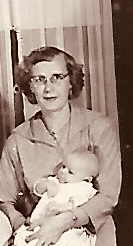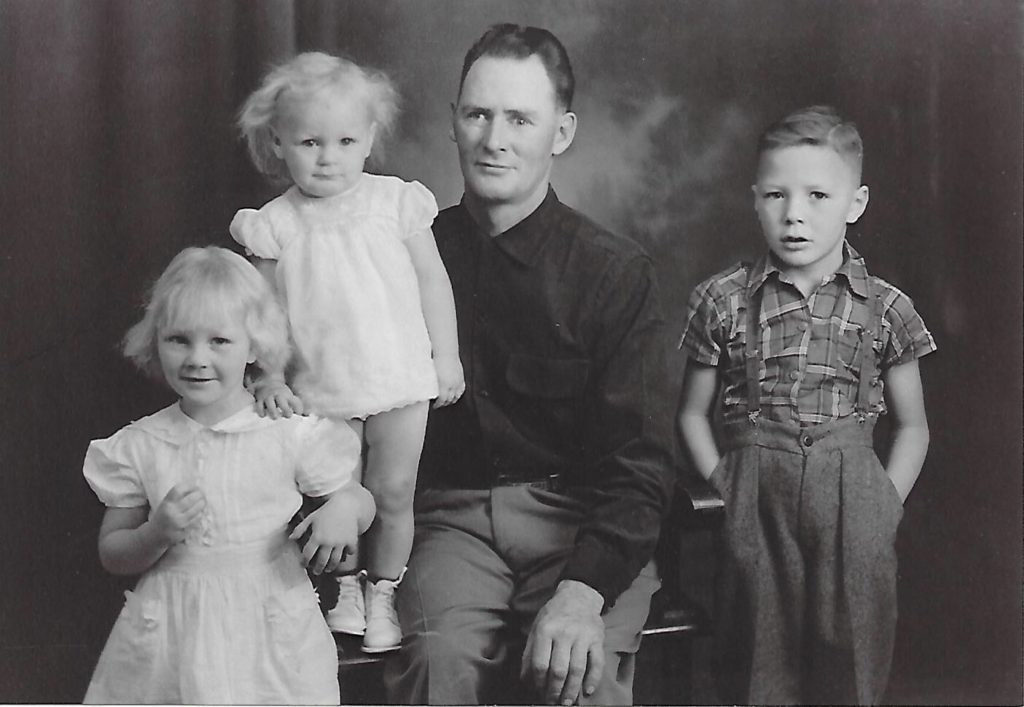It isn’t easy to write about cancer and the aftermath it has brought to us. Hopefully my writing (and other contributors) about the good and the bad in my lifetime will be something my children and their kids will learn lessons of what to do and what not to do. Some stories are hard to write but I will try my best to tell them as I can recall.
I had spent some part of summer vacation every year at my sister Verna’s home from 1948-1952. My cousin Colleen would join me there almost every year.
Verna had this huge garden and an abundance of water to grow fruit and vegetables. (We never had gardens like this at home. We even had water to wash the car- which we did weekly.) Squash, melons, garlic and my favourite food of all STRAWBERRIES right there in the garden. (I was never caught sneaking out in the evening to fetch a few strawberries although I’m sure it didn’t go unnoticed.) At that time there was a dance every Saturday Night in the town hall with a full sized orchestra. Every year we would usually get to two dances. Colleen and I were not very popular with the local girls but the local boys now that’s another story. After the dance was over we would go down to the “Cafe” for a Coke.
I remember one of the trips to Moose Jaw and a stop at the Eaton’s store. Verna bought me a navy pleated skirt, white blouse and red cardigan sweater. What a wonderful Big Sister I Had!
After she died from breast cancer, I missed Verna so much — and I never felt welcome at Wood’s house after she died.
In the 70’s, I started canvassing for the Canadian Cancer Society.
A dear friend of ours, George McCallum, who passed away in 2005, said his most fulfilling accomplishment was the 40-some years that he spent volunteering for the Canadian Cancer Society. He was the National Fundraising Chairman and for his tireless efforts he received the Queen’s Golden Jubilee Medal.
He asked me to chair the Cancer “Blitz” for the Hillsdale subdivision of Regina. For several years I had 37 volunteers head out from my house to canvass each household in Hillsdale. My theory for success was to have the same volunteers canvass the same area year-after-year. Every household except ONE donated yearly. To get these same people to come out and volunteer every year was simple. All I had to do was make good food and have drinks available for everyone — it was my way to thank them and make sure they came back.
My boss at work let the staff have the afternoon off to help me prepare the food, which was only fitting as they were all coming to my house to canvass anyway! Our community raised the most money of all communities in Regina every year. After I left the city they divided the Hillsdale Blitz area into two sections.
Needless to say we all support research to eventually find the CURE for cancer.
I remember how my Mom was devastated by the loss of her oldest daughter Verna. Mom, who had daily written in a diary, just couldn’t bring herself to put down any words for a number of years after Verna died. She was considered a soft spoken, cuddly, lady but she was tough too. She said she never suffered from anxiety or depression in later years as had many of her friends. She said losing her Mother when she was a teenager, then Lloyd, Verna, and Edna made her dig deep to cope and made her strong.
I have lost many friends to cancer including one of my early roommates, Leah, who died leaving three small children, my brother in law Bill Rowbotham, Doc’s cousin Marcella, just to name a few.
Thankfully there have been many who are cancer survivors.
I asked my niece Kate how losing her mother Verna to cancer had affected her life.
Kate has written the following:
April, 2018
Auntie Mo,
Next week I have an appointment for what seems like my ga-zillionth mammogram. Having reached age 65, I never forget that Mom (Verna) never made it past age 35. To say that my whole life has been defined by breast cancer and anxiety is an understatement. How could it be otherwise when cancer deprived me of my best female role model before my first birthday? How could it be otherwise when every doctor taking my family history becomes fixated on Mom, Aunt Edna and great-grandmother having breast cancer?
Yes, it was made abundantly clear to me that I am at high genetic risk for breast cancer. Every mammogram appointment is preceded by weeks of fear. On the flip side though, it has also motivated me to focus on the health factors that I can control – good nutrition, fitness and being a nonsmoker. I can’t prove that those good habits helped, but I believe they did.
The more important story though is how did my life unfold after Mom died. I don’t know how any baby could grow up in that aftermath without carrying a lot of emotional baggage. I certainly didn’t get out unscathed, but I’m glad to get a chance now to explain the impact. I hope my story serves to honour the Mom I never got to know and also give some insight into who I am and how I got this way.
Needless to say, the death of my Mom – without even a memory of her to cling to – led to an unnatural and unhappy childhood for me. I am not speaking for my older siblings, just myself. As the youngest, I may have been the most vulnerable. Babies and children are meant to be hugged by Moms who brush their hair and read them stories. There was none of that for me. Even worse, when I later realized Mom’s cancer started when she was pregnant with me, I wondered if the pregnancy had caused it. Maybe she would have lived if she never had that third pregnancy (me). I carried that guilt for many years.
When my Dad remarried, I was no longer the youngest child. Suddenly I was thrust into the middle of a blended family. I was age 5, turning 6. There were still no hugs for me, no quality family time and no life skills being taught to me at home. I also didn’t develop social or coping skills. The younger me had no self-esteem or confidence. I worried about every little thing and was sure I would never be good enough. I slept very poorly (always waking up hours before the rest of the family).
As far as I was concerned, help was not an option and asking for it might make things worse. Many times as a young girl I felt such despair that I would sit crying on my Mom’s cedar chest under the window upstairs. I would look up at the sky and beg her to come back… or to come and take me away… or at least show me that she was an angel watching over me. No amount of begging or wishing ever made it so. I had to accept that no one was coming to my rescue.
Growing up, there was never any discussion at home about my Mom. I assumed that was because Dad thought it was the best way to handle it and that it was just too painful for him. It’s sad that, in a way, we lost Mom twice because of it. After Dad married Doreen, it would have been rude or awkward for any of us to ask about our first Mom – not that we had a clue about what to ask anyway.
Although the silence about Mom’s life was probably not the best decision, I know it was made with the best of loving intentions. Take it from me though, nowadays if one parent dies when the kids are young, the living parent should absolutely make it a priority to keep the memories or connection alive by sharing positive stories, photos, scrapbooks, etc. – anything and everything that fills in the blanks about the missing parent. What’s at stake is a sense of history and healthy parental attachment for the kids.
Mom’s most personal possessions were stored and later given to Greg, Marcia and me in our adult years. Among the items I have are Mom’s watch and a handmade cedar jewelry box (I think Dad made it for Mom). These sentimental treasures must be 70 years old, yet the box still smells of cedar and the watch still works. Every now and then, I take out the watch, wind it up, listen to the soft ticking and think of Mom.
And now… a picture is truly worth a thousand words (see below).
The above family photo was probably the first and only formal picture of us (taken a year or so after Mom’s death). Dad looks incredibly sad and serious. We, the kids, look like an early prediction of how we would turn out. Marcia is cooperative, the most sociable and happy to be there as part of the family. She never tired of being the bond to hold us all together. She seemed to know the importance of family connections and carried that responsibility from a much younger age than should be expected of any child. Greg looks unsure, maybe aloof, independent, self-sufficient. I look uncooperative and not impressed. I resented my lot in life and was never going to make things easy (for myself or anyone). Even so, I see one funny perspective to this photo. Obviously, I had outgrown that dress and shoes, so no wonder I look grumpy. Also, no one was able to tame my wild hair (it still looks like that now on hot, humid days ).
Moving along to school years… Given that Mom was a teacher, it seems fitting that school and teachers became my first lifeline. It was my first memory of being praised and appreciated. Socially at school, I was borderline functional – mainly immature and introverted. I was never going to be athletic enough or pretty enough to be popular, so I worked at being the best student. I liked math because it was the perfect fit for my logical brain. It had rules, structure, reliability – all things that I craved. Soon I also got into reading (everything and anything I could find or borrow). Reading became my other escape (still is, actually).
Fast forward… Greg, Marcia and I all survived and thrived (well, in my case, eventually ). We all completed post-secondary education, had successful careers and now enjoy comfortable retirements. Greg and Marcia had families of their own, in original marriages that have stood the test of time. On Marcia’s wedding day, Dad was crying because she looked so much like Verna. It was two decades since Mom died, but Dad was still hurting and still had a clear visual memory of her.
As for the rest of my adult journey, I wasn’t destined or equipped to stay married or become a mom. Even so, I am proud of my other accomplishments and the best of my qualities – my academic record, a quick wit (to bring a laugh and a moment of joy to others), my love of writing and a strong sense of fairness, integrity and kindness. All things considered, a pretty good outcome.
~ Kate
(Kathryn Wood)


Great look at the different aspects of cancer
Thanks Rita